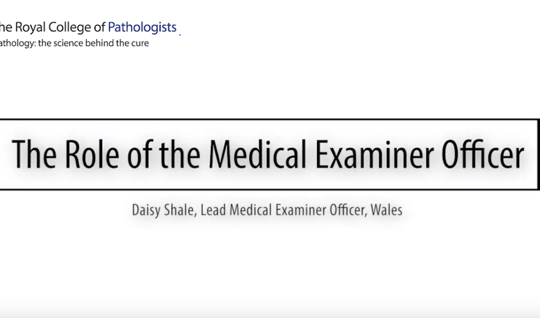Medical examiner officers
Medical Examiner Officers (MEOs) are a vital part of any Medical Examiner (ME) service in England, Wales, Northern Ireland and Gibraltar. As most MEs will work part time in the role, MEOs will provide the continuity and oversight that the service requires to have the maximum benefit.
Coming from a range of backgrounds, MEOs will be involved in all stages of the ME service, from talking to attending physicians, advising on the wording of death certificates and explaining this to bereaved families, as well as answering any questions they might have.
From several years’ experience as a medical examiner, I know medical examiner officers are pivotal to the success, effective implementation and running of the medical examiner system. This is why they are a core part of the national model. By obtaining medical records and performing appropriately delegated tasks they allow medical examiners to focus on scrutiny. They provide consistency as a constant in the office, offer professional support to medical examiners, and are an essential point of contact for people involved with care after death. Through training and experience, they can provide expertise in death certification processes, advising Qualified Attending Practitioners and liaising with registrars and coroners’ officers.
Medical examiner officers are a vital part of a medical examiner office team. Their skills and support are indispensable to the medical examiner, to ensure that a professional, caring and compassionate service is delivered to the bereaved, who are at the heart of the medical examiner system.
Dr Alan Fletcher, National Medical Examiner
Training
E-learning
All Medical Examiner Officers practising in England, Wales, Northern Ireland and Gibraltar should complete the 26 core e-learning modules before starting work in the role. There is no minimum time requirement but most people take 8-10 hours to complete the modules, and some have taken much longer. It is vital that you have completed this preparatory work to enable you to get the most out of the training day.
Complete your Medical Examiner Officer e-learning modules
Face-to-face or virtual training
Medical Examiner Officers should also attend a face-to-face or virtual training day, which is the second part of basic MEO training. Upcoming dates are listed alongside other events and conferences in our main events calendar.
Find Medical Examiner Officer training dates in our calendar
After completing these, MEOs practising in England, Wales, Northern Ireland and Gibraltar are entitled to apply to join the College and use the post-nominals RCPathMEO. Find out more about becoming a member.
Further training and induction
The e-learning and face to face training are only the start of your training as a MEO. You will learn new skills and information every day whilst undertaking the role through case discussions and interactions with colleagues, service users and the bereaved. Resources are available to develop your learning further and an individual CPD plan to identify your personal learning requirements.
Find out more about further training opportunities
Recruitment
The following model job description has been created by the Department for Health and Social Care to assist employers with recruiting MEOs in their area.


